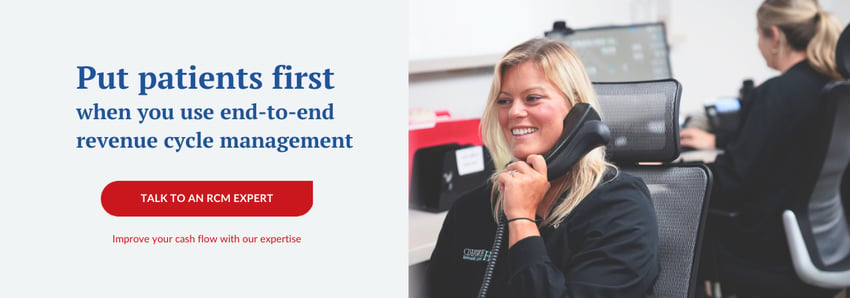In-house dental billing vs outsourced: What’s best for your practice?
.jpg)

When dentists decide to fix revenue problems, they often get to a point where they are trying to choose between hiring an experienced in-house dental biller or an outsourced dental billing company. It’s hard to determine which is the better fit for your dental practice if you’re in this position.
You want to grow your revenue by increasing your collections percentage and collecting on everything you produce. You also want a more streamlined billing process that gives you cost-effective results. You need the right help to get this done, specifically an expert to take over your insurance billing.
In the past, you may have turned to your office manager, or someone else on your administrative team, but you’re finding the results you want aren’t there. Maybe your dental team doesn't actually have the time or expertise to devote to your insurance claims. Regardless, something needs to change.
Here at Dental ClaimSupport, we show our clients the value of having a streamlined billing process, and how that, along with having an expert biller on your team can help your practice bring in more revenue and improve the overall health of your dental practice.
In this article, we’re going to help you understand how to choose the right billing solution for your practice. It could be hiring a seasoned insurance coordinator to join your internal administrative team, or it could be outsourcing to a dental billing company, and having a remote biller work alongside your team to get your insurance claims paid.
This choice depends on your dental practice and what suits your finances, your team dynamic preference, and your overall goals for your practice.
Hiring an in-house billing team at your dental practice
Hiring an in-house biller can be a big financial commitment for your practice, and it may seem like a huge undertaking to add another full-time salary with benefits to your overhead. There are, of course, some benefits to this choice though.
Pros of hiring in-house billers
Hiring an insurance coordinator means you are looking for someone with years of experience, who understands the ins and outs of how insurance plans and benefits work. This person will join your internal team and here are some benefits:
- An in-house biller is there in person to answer questions or concerns. Do you or someone else on your dental team have a question about a patient’s coverage? An in-house insurance biller is in the office. You can pop your head into their office, or walk over to their desk to chat with them if you need to. You don’t have to wait long for an answer or response from your in-house biller because they’re right there with you in person.
- You can maintain the feeling of control over your insurance billing. An in-house biller is one of your employees. You or your office manager can still feel in control of your billing process when you hire your own insurance coordinator. (A dental billing company doesn’t really take control away from your team, but it’s a common feeling we’ve seen in-house team members have at first, which we’ll get to shortly).
- Your in-house biller will feel like part of your team. When you keep the billing in-house, it feels like you’re cultivating a team, where everyone is after the same goal. It’s also easier to trust someone that you are likely creating a friendship with, and you see their face every day. You can see how they work, what their habits are, and collaborate easily on things. This can create a great employee dynamic within the office.
While these are all great reasons to keep your billing in-house, there are a few drawbacks to consider.
Cons of hiring in-house billers
As we said, it’s a huge undertaking to hire a seasoned insurance coordinator. Here are a few of the biggest disadvantages to this decision:
- It’s expensive. An insurance coordinator’s salary can range anywhere from $50,000 to $70,000 annually. This also does not include a benefits package if that’s something you offer. Not to mention, any bonuses you would give out to your employees would also add up. This isn’t a position you can fill with just anyone who will accept minimum wage. You need someone experienced who knows what they’re doing. That, in itself, can cost about 62% more than outsourcing this function.
- There is less flexibility when it comes to a “trial” period. Since you’re hiring a full-time employee, you’re trusting they know how to perform this job. It happens more often than you think, that dentists hire someone who doesn’t know how to post payments accurately, work with adjustments, research claims and appeal claim denials. You can’t always trust a resume. You need to assess their skills before you hire them on.
Even if they have 20 years of experience working at a dental practice as an office manager, that doesn’t mean they understand insurance billing. If they end up not being a good fit for your practice, or their performance is not up to par, you can’t put a “pause” on their services. And letting people go can get expensive and complicated if you don’t have processes in place. Not to mention, improper billing techniques can create a loss of revenue for practices.
- They don’t have access to a pool of other expert billing professionals. It’s likely your in-house insurance coordinator works in insurance billing alone. If they ever have a question or need assistance - chances are no one else in the office knows how to do their job. Or, if they’re out of town or have an emergency - insurance billing is put on the back burner until they return.
Now that you understand the pros and cons of hiring an in-house insurance coordinator, here’s what to consider when hiring an outsourced dental billing company.
Hiring an outsourced dental billing company at your dental practice
Many dentists want a tool that will handle their insurance billing in a way that they will never have to worry about it. Some dentists want to be more involved.
Outsourcing to a dental billing company can be a tool for any kind of dentist who wants a pool of experts consistently submitting claims and following through with each one until they are paid.
Pros of hiring a dental billing company
For dentists who do not want to go through hiring a full-time employee to handle their insurance billing, here are a few pros to outsourcing it:
- They handle the insurance billing so your team doesn’t have to. A lot of people dread working with insurance claims and dealing with insurance companies. Outsourced dental billing companies, of course, don’t hate it. They will handle the nitty-gritty of working the outstanding claims aging report, researching denied claims, and waiting on hold to appeal them while your team focuses on other important tasks in the office.
- Outsourcing your insurance billing is the least expensive option. People are always shocked when they hear this, but it’s true. Most dental billing companies bill their dental offices based on their size, and how much revenue they bring in. Depending on the size of the practice, the monthly rate can range from $1,300 to $5,000 per month. As we mentioned, an insurance coordinator with proper experience is going to cost around $5,000 per month - minimum, if you only need one person (again, if you run a big practice, this could be more).
- Outsourced remote billers have a pool of experts at their disposal. We can’t speak for every dental billing company, but our remote billers all communicate with one another even if they’re working with different offices. If anyone has a question, there’s a huge pool of other billing experts they can turn to for answers or best practices. This knowledge pool better equips them to face any claim challenge your dental practice could be facing.
Here are a few cons.
Cons of hiring a dental billing company
All of these pros sound great and logical, but there are still things to consider.
- Outsourcing might be a tough transition for your dental team if they aren’t on board. We have seen teams, specifically office managers and other members of the administrative team resist working with a dental billing company. Whether it’s a feeling of lost control or a “stranger in their house,” it can be a hard transition to hand over the insurance billing to a person you don’t know.
- Consistent communication is involved. This doesn’t really sound like a con, but it can be for those who are used to their billing person being around the corner at another desk. Your outsourced biller will be working remotely in your dental software, and this means if there are any questions or concerns, you will have to call or email them. Communication doesn’t come naturally for everyone, but it’s required to work with a remote biller.
- You are handing your insurance billing over to someone outside the office. Like we said, the outsourced biller will work remotely in your dental software. You’ll likely never meet them except on Zoom. This can be a huge challenge for some offices because it requires the team to trust the process and the person they’re handing the billing over to. It can feel unnatural to some teams and like a loss of control. However, getting fast, accurate insurance payments helps you bring all your revenue streams under control. Patient billing becomes crystal clear, for example.
Learn more about the relationship between an office manager and remote dental biller in our Learning Center.

Do you think outsourced dental billing might be right for you?
If you choose to hire an in-house biller, it’s crucial that you choose someone qualified. Sometimes it’s not enough to just read a resume. You can verify that this person is up to the job by assessing their insurance billing skills.
When it comes to outsourcing your insurance billing, you do have to properly communicate to your team what the purpose is. This will prevent team members from feeling territorial and stepped on by the remote biller who is truly there to lessen the chaos that comes with insurance billing.
Be sure to make the choice that is going to be the most profitable and improve the financial health of your practice the most.
Dental ClaimSupport offers insurance billing services to dental offices that need relief from insurance strain, and a more streamlined billing process. Our remote billers are all formally trained, vetted, and assessed before working with dental offices, ensuring you get high-quality billing service.
To dive deeper into learning if outsourcing your insurance billing is right for you, read our article, “5 signs your dental practice needs an insurance billing company.”
Related Posts
Dental revenue resources from Dental Claim Support



